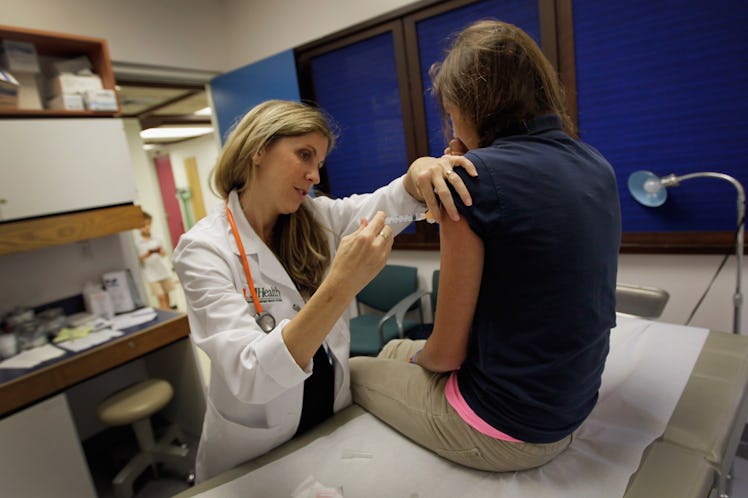
The FDA Says You Can Get The Gardasil Shot Past Age 26, So Make An Appointment, Girl
If you regularly went to the pediatrician as a kid, then you probably remember having a kind of awkward conversation with your doctor about getting a vaccine called Gardasil. I had the first shot in my early teens, and I remember being frustrated that I had to be poked with needles to protect myself from an STD when I wasn't even sexually active. But if you missed out on getting the shot in your childhood, and you're wondering at what age you can still get the HPV vaccine before it's too late, the FDA recently announced that you can still get the Gardasil shot as long as you're under 45 years old — so go make an appointment with your doctor, and get ready to rock a colorful bandaid, my friend.
In case you aren't familiar with it, Gardasil 9 is a vaccine that protects against human papillomavirus (HPV), which is a sexually transmitted disease. According to the FDA's press release about the new age-range approval, before 2014, the vaccine was just called Gardasil, but the Gardasil 9 version — which protects you from nine different strains of HPV — is what's currently being administered.
The thing is, HPV isn't worth taking your chances on; it's not only very common, it can also lead to some major health problems in the long run. According to the Centers for Disease Control and Prevention (CDC), approximately 80 million people in the U.S. (or one in four, if you're having trouble visualizing that number) currently have HPV, and what's especially tricky about it is that, as per the CDC, "most people with HPV never develop symptoms or health problems." But for those who do experience long-term health issues as a result of an HPV infection, the CDC says the condition can cause cancers of the genitals and/or reproductive organs, or even throat cancer, for both men and women.
In the past, the vaccine was recommended for people between 9 and 26 years old, according to the American Cancer Society. Receiving the first shot at around 11 or 12 years old was considered ideal, and anyone who received the vaccine at age 22 or older may not have received the full benefits, the organization explains.
However, the FDA's recent expansion of Gardasil 9, according to a press release from the organization, means that the vaccine can still protect you from HPV after the age of 26. The press release states,
In a study in approximately 3,200 women 27 through 45 years of age, followed for an average of 3.5 years, Gardasil was 88 percent effective in the prevention of a combined endpoint of persistent infection, genital warts, vulvar and vaginal precancerous lesions, cervical precancerous lesions, and cervical cancer related to HPV types covered by the vaccine.
Keep in mind, though, this vaccine isn't just a one-time deal. According to Planned Parenthood, if you're between 9 and 14 years old, you only need two shots to be protected, but if you're in the 15 to 26 age range, you need to receive three shots over a period of about six months.
Of course, having to go back to the doctor again and again can be tricky to fit into your schedule. In fact, a 2016 study published in the medical journal Human Vaccines & Immunotherapeutics showed that it's not uncommon for teens and their parents to either forget to schedule all of the necessary doses, or to just not complete the series of shots for various reasons.
So, if this sounds like a lot of time and inconvenience, I feel you. But if you only got the first vaccine, and you never got around to finishing the rest of the series, luckily, you don't have to start all over again.
In response to a question posed to CNN's blog The Chart, pediatrician Dr. Jennifer Shu explained that the first dose of the HPV vaccine alone can give you some protection against the different HPV strains. In fact, making sure the time between the shots is long enough is actually pretty important, Dr. Shu said. The time between shots one and two should be at least a month, she explained, and shots two and three should be at least three months apart. Luckily, she said, there's no need to repeat the first shot, even if it's been years since you had it.
Bottom line: The time for procrastination is over, y'all. If you're ready to get the HPV vaccine, make an appointment at your local Walgreens or CVS, or just call up your regular doctor to set something up.